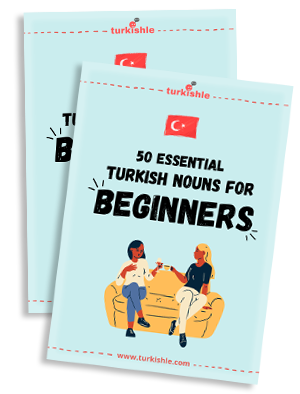How to learn Turkish from scratch
learn Turkish from scratch
There are so many languages to learn, and just as many reasons to want to learn one. Some people learn languages for travel and cultural immersion, others just to put one on their resume. If you are new to the world of language learning, then you might be wondering how to learn Turkish from scratch. There are so many resources out there, but you don’t know what’s worth your time or money, so we prepared this guide to show you how to learn Turkish from scratch in the most fun and efficient way. Here are a few tips for getting started:
1. Start watching Turkish series and movies

When you start out learning a new language it’s very natural to feel lost and all over the place, as the first step, it’s always best to get into the culture and learn how native speakers really speak the language!
Listen closely and hear Turkish native speakers talking, try to learn how they get excited and show their emotions or how they talk passionately about something.
You are not supposed to learn the intonations at the very beginning but your ears will get used to Turkish speakers’ tones and that’s the first step to improving your listening skill.
If you don’t know where to find Turkish series you can check out “Best series to learn Turkish” we provided the links to all the Turkish series to make everything easier for you!
2. Start with a tutor or an online course

You can start any language at home on your own getting help from all the free resources on the internet including Turkishle YouTube channel but this is not for everyone and we don’t recommend you do that when you start out.
It’s the best idea to find a good tutor to teach you the basics or if you’re not comfortable doing that you can always find online courses to study at your own pace from the comfort of your own home.
Turkishle team has prepared an A1 course for you who want to start learning Turkish language you can check it here.
3. Travel to Turkey if you can

If you’re able to travel to Turkey you’ll have a great chance for Turkish language acquisition. If you start talking to Turkish people in basic Turkish they would love that and actually admire your effort in learning Turkish! They would be happy to help you learn more or practice the language.
Other than the free opportunity to talk to people on the streets there are language clubs or sessions for polyglots that you can look for them and find out more about them.
4. Talk to the native speakers

You don’t always have to travel to a destination to find new friends or people to talk to!
The good news is that thanks to all the social media platforms and applications available to language learners you have this opportunity to find people online and practice with them, we have another post dedicated to all the applications that you can use for this purpose so you can read here: “How to find Turkish friends” or ” How to practice Turkish speaking with native speakers”
5. Watch Turkish YouTube channels

Another good way to learn Turkish other than watching Turkish series and movies is to watch people naturally talk about daily life or express themselves in different situations. The good news is that there are plenty of YouTube channels creating an unlimited amount of free content on different topics like cooking, travel, tech, etc. So you can watch different videos on different subjects based on your interests.
If you don’t know where to look check out our blog post “10 Turkish YouTubers to learn Turkish” to start with some of our favorite Turkish YouTubers.
6. Listen to Turkish music

Create a Turkish playlist and find your favorite songs, the ones you feel connected to, and create the habit of listening to this playlist every day. You might not have a clue what they are singing about or what they’re even saying! We have created a complete guide on “How to listen to Turkish music and understand every word” you can take a look and learn how to do it!
even if you are not ready to analyze what you hear, keep listening to the songs and try to sing with them! that’s when language acquisition happens! You learn the most when you don’t aim to learn and you’re just enjoying the language itself!
7. Stay organized

When you’re learning Turkish you’ll stumble upon so many new vocabulary or verbs that you need to conjugate and you have to keep practicing them to get used to them after a while, you don’t even need to double-check to see if the sentence you made is correct.
The key here is to stay organized and neat while taking notes and creating sheets that can actually help you learn! For this purpose, we created a “Vocabulary in context sheet” for everyone who wants to keep the new words and a sample sentence to see where they can use the specific word or where they can use it.
Another sheet we created for our students is the “Verb conjugation sheet” which is a huge help to conjugate the verbs in different tenses and review them from time to time. Practice makes perfect so don’t expect yourself to learn something so fast and keep reminding yourself that consistency and hard work always pay off!
Some people would tell you that you need to try so hard to learn a language or you might feel so while learning Turkish, but remember learning a language be it Turkish or any other language needs time and energy. It should be added to your daily routine, no matter if you put 15 minutes a day or 3 hours, your brain needs to feel committed to what you are doing.
It might be hard to start out but everything makes sense after a while.
Have fun learning Turkish!







Actually I love Turkey turkey is my dream destination country. I also watching Turkish drama, movies or videos. I want visit there but I am a Student so when I will complete my graduation I will definitely visit there. I want to live there want to feel turkey as a native citizen ✨✨🥰☺️
That’s amazing! Good luck!
I want to to thank you for this good read!! I certainly loved every little bit of it. I have you bookmarked to look at new things you postÖ
We’re happy to know you enjoyed our blog post! 🙂
I’ve tried to learn Turkish many times and failed each time. It seems to me – and this may apply to other languages, too – that Turks are not the best people to teach their language because it is natural to them and they cannot imagine how difficult it is for foreigners to learn. I would suggest that the best teachers would be those from other nations who have learned Turkish and who can then empathise with their pupils and the difficulties they face. In my case, that would mean a British person who has learned Turkish; s/he could then understand my difficulties without my having to explain the..